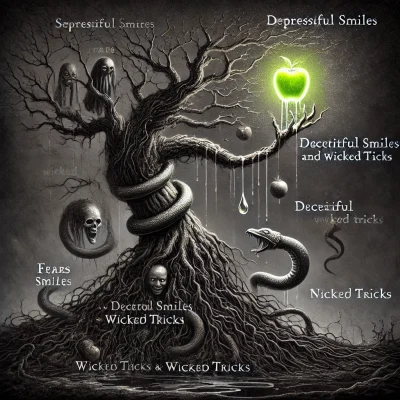SSLC English Question and Answer: A Poison Tree
Looking for SSLC English Studies textbook answers? You can download Chapter 5: A Poison Tree Questions and Answers PDF, Notes, and Summary here. SSLC English 1st Language solutions follow the Karnataka State Board Syllabus, making it easier for students to revise and score higher in exams.
Karnataka SSLC English Textbook Answers—Reflections Poem 5
A Poison Tree Questions and Answers, Notes, and Summary
Class 10 English Pome Chapter 5
A Poison Tree
Scroll Down to Download A Poison Tree PDF
Comprehension I: A Poison Tree
Question 1.
What happened when the speaker expressed his anger?
Answer:
The anger ended when the speaker expressed his anger.
Question 2.
What happened when the speaker suppressed his anger?
Answer:
When the speaker suppressed his anger, it only grew.
Question 3.
How do the results differ in the two instances?
Answer:
Expression of anger in the first instance relieves the person of all ill feelings, whereas suppression of anger in the second instance poisons him all the more because it grows.
Question 4.
When the poet is thinking about his anger, the picture of a tree comes to his mind. Which word in the first stanza suggests a tree?
Answer:
‘grow’. The pronoun, ‘it’ implies that the poet is talking about a tree. The line Till it bore an apple bright;’ supports this answer.
Question 5.
The speaker helped his anger to grow. The second stanza mentions the different ways in which he helped his anger grow. What are the different ways?
Answer:
The speaker watered it in fear, night and morning with his tears and sunned it with smiles.
Question 6.
“watered it in fears” suggests that
a. the speaker did not dare to express his anger
b. the speaker was afraid of the consequences
c. the speaker didn’t want to displease his enemy
Answer:
(b) the speaker was afraid of the consequences.
Question 7.
The word ‘tears’ suggests that
a. the speaker too suffered for suppressing his anger
b. the enemy suffered
c. the speaker had to go through a lot of anxiety
Answer:
(c) the speaker had to go through a lot of anxiety.
Question 8.
“sunned it with smiles” suggests that
a. the speaker cunningly hid his anger with bright smiles
b. the speaker pretended that he was not angry
c. the speaker let his anger grow secretly
Answer:
(a) The speaker cunningly hid his anger with bright smiles.
Question 9.
Which line tells you that the speaker is a scheming and cunning friend?
Answer:
And I sunned with smiles
And with soft, deceitful wiles.
Question 10.
The second stanza continues the image (picture) of a tree suggested in the first stanza. Which words in the second stanza refer to a growing
Answer:
“Water’dHsunned it’.
Question 11.
The poet, so far, has been talking about
a. his suppressed anger
b. a growing tree
c. both
Answer:
(a) his suppressed anger.
Question 12.
What kind of a tree and fruit (here apple) can grow when they are nurtured by fears, tears, hypocritical smiles and deceitful wiles?
Answer:
A poison tree with poisonous fruits.
Question 13.
The word ‘it’ occurs in all the four lines of the 3rd stanza. What does ‘it’ refer to in each line?
Answer:
‘It’ in the first line of the 3rd stanza refers to the speaker’s suppressed anger. In the 2nd line, it refers to a poison tree, In the third and fourth lines, it refers to a bright poisonous apple.
Question 14.
“Apple” in the poem refers to
a. the forbidden but tempting apple in the Garden of Eden (in The Bible)
b. the consequence of suppressing anger
c. the fruit of his enmity
Answer:
(b) the consequence of suppressing anger.
Question 15.
The apple is ‘bright’ because
a. it is intended to attract the foe
b. it is intended to tempt the foe
c. it is cunningly devised to hide the bitterness
Answer:
(c) it is cunningly devised to hide the bitterness.
Question 16.
Who “stole” into the speaker’s garden?
Answer:
The enemy
Question 17.
The word “stole” means
a. that the enemy stole the apple
b. that the enemy entered the speaker’s garden stealthily
Answer:
(b) that the enemy entered the speaker’s garden stealthily.
Question 18.
What does the speaker see in the morning?
Answer:
The speaker sees his enemy dead under the apple tree in the morning.
Question 19.
Why, do you think, “dies” at the end? Is it only the enemy? Does the speaker also die? What kind of death ‘does he die?
Answer:
The enemy is physically and truly dead. But the speaker also suffers a lot of guilt for having caused this death. Though he is alive physically, he is emotionally dead.
Question 20.
“A Poison Tree” could refer to
a. the tree of hatred and enmity grew by the seed of suppressed anger
b. the destructive effect of being hypocritical and deceitful
c. the spiritual death of a person for nurturing base passions
Answer:
All of the above.
Comprehension II: A Poison Tree
Question 1.
“And into my garden stole/when the night had veiled the pole.”.
a) Who stole into the garden?
Answer:
The speaker’s enemy stole into the garden.
b) Why did he steal into the garden?
Answer:
He came stealthily to steal the apple from the speaker’s apple tree.
c) Explain the phrase ‘veiled the pole’.
Answer:
Veil’d’ means ‘covers’. It can also mean ‘deliberately hide to fool someone.’
Question 2.
And I sunned it with smiles And with soft deceitful wiles
a) What does the word “sunned’ suggest?
Answer:
As long as the speaker smiles hypocritically, his anger with his foe continues to grow. Thus, his smiles act upon his anger like sunshine, helping it to grow.
b) Explain the phrase “deceitful wiles”
Answer:
‘Deceitful’ means ‘deliberately done to fool someone’. The speaker pretends to be friendly with his enemy by behaving in a very sweet manner.
c) Why had the speaker “sunned” it?
Answer:
The speaker was afraid to express his anger with his enemy. Hence he pretended to be friendly and happy with him. This pretence only made his anger grow.
Comprehension III: A Poison Tree
Question 1.
How does the poet use the image of a tree to bring out the destructive effect of suppressed anger?
Answer:
The poet vividly uses the image of a tree to illustrate the destructive consequences of suppressed anger. The speaker, instead of expressing his anger, allows it to fester and grow. This anger is symbolized by a tree, which the speaker nurtures with fears, tears, false smiles, and deceitful actions, much like a tree is watered and given sunlight to thrive.
As the tree of anger grows, it eventually bears a bright and alluring apple, reminiscent of the apple in the Garden of Eden. This tempting fruit catches the eye of the speaker’s friend, who, unaware of its true nature, steals it under the cover of night. Consuming the apple proves fatal, as it leads to the friend’s death. The speaker, although seemingly victorious, suffers a spiritual death, having allowed his anger to flourish and rejoicing in the demise of his friend. The poem powerfully conveys how suppressed anger can grow into something deadly, destroying both the one who harbours it and those around them.
A Poison Tree Poem Summary
This powerful and meaningful poem by William Blake vividly portrays the consequences of suppressed anger. The speaker describes a situation where, when angry with a friend, he expresses his feelings, allowing the anger to dissipate. However, when angered by an enemy, he chooses to suppress it instead. This repressed anger is fueled by his various fears and anxieties about the enemy, which metaphorically “water” the anger, allowing it to grow.
The speaker’s apprehensions and the tears he sheds further nourish this anger. He “suns” the anger, providing it with light and heat, by engaging in hypocritical behavior. Pretending to be friendly, he deceives his enemy with smiles and soft, deceitful tricks, all the while hiding his true feelings.
Blake uses a powerful image to represent the speaker’s suppressed anger: a tree. The hatred that the speaker harbors in his heart towards his enemy manifests as an apple tree, which bears a bright and tempting apple. Drawn by its allure, the enemy sneaks in at night to steal the apple.
However, this tree, nurtured by the speaker’s anger, has become poisonous. The fruit it bears is deadly, and when the enemy eats the apple, he dies instantly. The next morning, the speaker finds his enemy’s lifeless body stretched out beneath the tree and feels a twisted sense of satisfaction at the sight.
Through this vivid imagery, Blake illustrates the destructive power of suppressed anger. The hatred that the speaker cultivates ultimately kills his enemy, not directly, but through the poisonous fruit borne from his evil thoughts.

